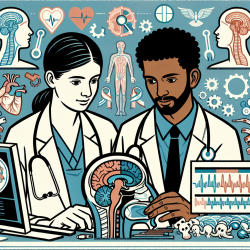Introduction
In the realm of speech-language pathology, data-driven decisions are pivotal in shaping effective therapeutic interventions. The research article "Health Professional Training and Capacity Strengthening Through International Academic Partnerships: The First Five Years of the Human Resources for Health Program in Rwanda" provides a robust framework for enhancing professional skills through strategic international collaborations.
Key Findings and Implementation
The Human Resources for Health (HRH) Program in Rwanda, initiated in 2012, stands as a testament to the power of international academic partnerships. The program's primary goal was to develop a competent health workforce and strengthen the capacity of academic institutions in Rwanda. Over the first five years, the program successfully deployed an average of 99 visiting faculty annually from US academic institutions to support 22 training programs, aiming to graduate nearly 4600 students by 2019.
For practitioners in speech-language pathology, the HRH Program offers several insights:
- Competency-Based Training: Emphasizing competency-based training ensures that practitioners are equipped with the necessary skills to meet local healthcare needs effectively.
- Institutional Capacity Strengthening: Building the capacity of local institutions through partnerships can lead to sustainable improvements in healthcare delivery.
- Long-Term Sustainability: The program highlights the importance of sustainability strategies, such as recruiting local faculty to gradually replace visiting faculty, ensuring the continuity of training programs.
Encouraging Further Research
Practitioners are encouraged to delve deeper into the outcomes of the HRH Program to explore how similar strategies can be adapted to other contexts, including speech-language pathology. Investigating the program's approach to twinning—pairing visiting faculty with local counterparts—can provide valuable insights into enhancing collaborative learning and skill transfer.
Additionally, exploring the challenges faced by the HRH Program, such as funding sustainability and coordination among stakeholders, can inform the development of robust frameworks for future initiatives.
Conclusion
The HRH Program in Rwanda exemplifies how international academic partnerships can drive significant improvements in health professional training. By leveraging the insights from this program, practitioners in speech-language pathology can enhance their skills and contribute to creating better outcomes for children and other populations in need.
To read the original research paper, please follow this link: Health Professional Training and Capacity Strengthening Through International Academic Partnerships: The First Five Years of the Human Resources for Health Program in Rwanda.










